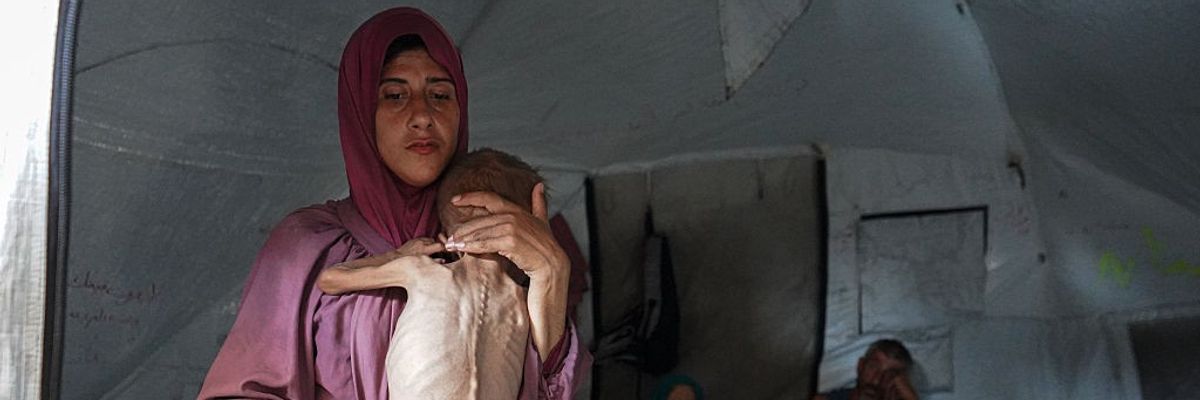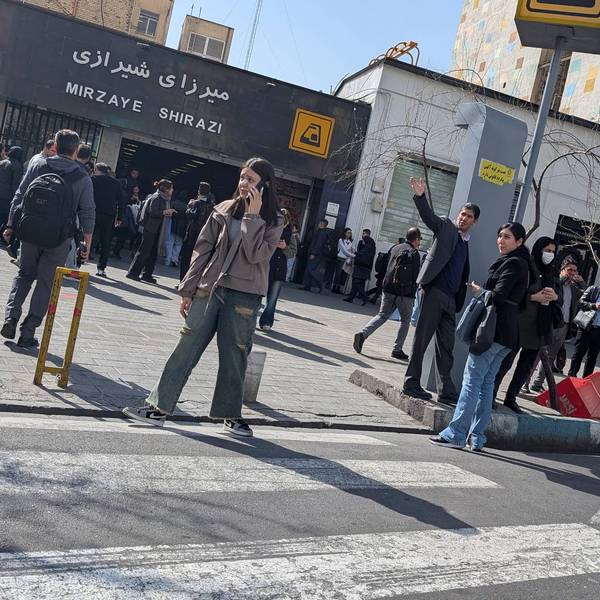
A Palestinian woman holds her severely malnourished 1.5-year-old son, Muhammad Zakariya Ayyoub al-Matouq, inside a tent shelter in Deirl Al-Balah, Gaza on July 29, 2025.
It Cannot Be Denied: Israel Is Starving Children to Death on Purpose
Starvation of civilians is not an accident of war, it is a deliberate policy.
In July, major news organizations published the image of 18-month-old Muhammad Zakariya Ayyoub al-Matouq, a Palestinian child so emaciated that his bones protruded through his back, while his mom cradled him in her arms. Instead of a diaper, he wore a black plastic bag.
Some online commentators have sought to downplay the image’s power by pointing to a preexisting medical condition. But Muhammad is starving as the result of Israel’s use of starvation of civilians as a weapon of war. This is a war crime that is affecting the entire population and, based on my research, is inflicting particularly profound suffering on children with disabilities like Muhammad.
Humanitarian workers told me that restrictions on aid prevent them from bringing in special food that some children with disabilities or medical conditions need, while medical workers warned that children with disabilities are less likely to get care due to the Israeli government’s systematic assault on Gaza’s healthcare infrastructure.
In mid-August, in Geneva, I joined the United Nations Committee on the Rights of Persons with Disabilities for its session focused on the Occupied Palestinian Territory. Under the Convention on the Rights of Persons with Disabilities, governments are required to protect people with disabilities in situations of risks, including armed conflicts. The message from disability groups was clear: Governments need to press Israeli authorities to allow unimpeded, disability-inclusive humanitarian access and not leave children like Muhammad to suffer the consequences of intentional starvation.
Muhammad’s image should move world leaders to use all their leverage with Israel, including an arms embargo and targeted sanctions, to stop Israeli authorities’ mass starvation policy.
There are countless examples of Palestinian children with disabilities thriving with adequate nutrition and healthcare. In just one example, 6-year-old Fadi al-Zant, who has cystic fibrosis and was severely malnourished, was evacuated to the United States from Gaza last year and survived. Osman Shahin, a 16-year-old boy with cerebral palsy who had lost 7 kilograms, regained weight after his family left Gaza for Bosnia.
But Muhammed and other children in Gaza do not have that chance. Between April and mid-July alone, more than 20,000 children in Gaza were hospitalized for acute malnourishment, 3,000 of them severely. Starvation of civilians is not an accident of war, it is a deliberate policy.
Muhammad’s image should move world leaders to use all their leverage with Israel, including an arms embargo and targeted sanctions, to stop Israeli authorities’ mass starvation policy. Muhammad’s disability does not make his starvation less cruel or unlawful; it makes it all the more urgent for countries to act now.
An Urgent Message From Our Co-Founder
Dear Common Dreams reader, The U.S. is on a fast track to authoritarianism like nothing I've ever seen. Meanwhile, corporate news outlets are utterly capitulating to Trump, twisting their coverage to avoid drawing his ire while lining up to stuff cash in his pockets. That's why I believe that Common Dreams is doing the best and most consequential reporting that we've ever done. Our small but mighty team is a progressive reporting powerhouse, covering the news every day that the corporate media never will. Our mission has always been simple: To inform. To inspire. And to ignite change for the common good. Now here's the key piece that I want all our readers to understand: None of this would be possible without your financial support. That's not just some fundraising cliche. It's the absolute and literal truth. We don't accept corporate advertising and never will. We don't have a paywall because we don't think people should be blocked from critical news based on their ability to pay. Everything we do is funded by the donations of readers like you. Will you donate now to help power the nonprofit, independent reporting of Common Dreams? Thank you for being a vital member of our community. Together, we can keep independent journalism alive when it’s needed most. - Craig Brown, Co-founder |
In July, major news organizations published the image of 18-month-old Muhammad Zakariya Ayyoub al-Matouq, a Palestinian child so emaciated that his bones protruded through his back, while his mom cradled him in her arms. Instead of a diaper, he wore a black plastic bag.
Some online commentators have sought to downplay the image’s power by pointing to a preexisting medical condition. But Muhammad is starving as the result of Israel’s use of starvation of civilians as a weapon of war. This is a war crime that is affecting the entire population and, based on my research, is inflicting particularly profound suffering on children with disabilities like Muhammad.
Humanitarian workers told me that restrictions on aid prevent them from bringing in special food that some children with disabilities or medical conditions need, while medical workers warned that children with disabilities are less likely to get care due to the Israeli government’s systematic assault on Gaza’s healthcare infrastructure.
In mid-August, in Geneva, I joined the United Nations Committee on the Rights of Persons with Disabilities for its session focused on the Occupied Palestinian Territory. Under the Convention on the Rights of Persons with Disabilities, governments are required to protect people with disabilities in situations of risks, including armed conflicts. The message from disability groups was clear: Governments need to press Israeli authorities to allow unimpeded, disability-inclusive humanitarian access and not leave children like Muhammad to suffer the consequences of intentional starvation.
Muhammad’s image should move world leaders to use all their leverage with Israel, including an arms embargo and targeted sanctions, to stop Israeli authorities’ mass starvation policy.
There are countless examples of Palestinian children with disabilities thriving with adequate nutrition and healthcare. In just one example, 6-year-old Fadi al-Zant, who has cystic fibrosis and was severely malnourished, was evacuated to the United States from Gaza last year and survived. Osman Shahin, a 16-year-old boy with cerebral palsy who had lost 7 kilograms, regained weight after his family left Gaza for Bosnia.
But Muhammed and other children in Gaza do not have that chance. Between April and mid-July alone, more than 20,000 children in Gaza were hospitalized for acute malnourishment, 3,000 of them severely. Starvation of civilians is not an accident of war, it is a deliberate policy.
Muhammad’s image should move world leaders to use all their leverage with Israel, including an arms embargo and targeted sanctions, to stop Israeli authorities’ mass starvation policy. Muhammad’s disability does not make his starvation less cruel or unlawful; it makes it all the more urgent for countries to act now.
- 'Children Are Being Starved By Design': All of Gaza Faces Hunger Crisis Due to Israeli Siege ›
- Group Documents Israel's Starvation of 2 Palestinian Children in Past Week ›
- Aid Group Warns New UN Figures Show 'Hunger Catastrophe' for Gaza Children ›
- Doctors and Aid Workers Can Save Gaza’s Starving Children—If Israel and the US Let Us ›
- 'Civilized People Do Not Starve Children to Death': Sanders Rips US-Backed Israel's 68-Day Gaza Aid Blockade ›
- 'End This War Crime': HRW Says Israel Is Starving Children to Death in Gaza ›
In July, major news organizations published the image of 18-month-old Muhammad Zakariya Ayyoub al-Matouq, a Palestinian child so emaciated that his bones protruded through his back, while his mom cradled him in her arms. Instead of a diaper, he wore a black plastic bag.
Some online commentators have sought to downplay the image’s power by pointing to a preexisting medical condition. But Muhammad is starving as the result of Israel’s use of starvation of civilians as a weapon of war. This is a war crime that is affecting the entire population and, based on my research, is inflicting particularly profound suffering on children with disabilities like Muhammad.
Humanitarian workers told me that restrictions on aid prevent them from bringing in special food that some children with disabilities or medical conditions need, while medical workers warned that children with disabilities are less likely to get care due to the Israeli government’s systematic assault on Gaza’s healthcare infrastructure.
In mid-August, in Geneva, I joined the United Nations Committee on the Rights of Persons with Disabilities for its session focused on the Occupied Palestinian Territory. Under the Convention on the Rights of Persons with Disabilities, governments are required to protect people with disabilities in situations of risks, including armed conflicts. The message from disability groups was clear: Governments need to press Israeli authorities to allow unimpeded, disability-inclusive humanitarian access and not leave children like Muhammad to suffer the consequences of intentional starvation.
Muhammad’s image should move world leaders to use all their leverage with Israel, including an arms embargo and targeted sanctions, to stop Israeli authorities’ mass starvation policy.
There are countless examples of Palestinian children with disabilities thriving with adequate nutrition and healthcare. In just one example, 6-year-old Fadi al-Zant, who has cystic fibrosis and was severely malnourished, was evacuated to the United States from Gaza last year and survived. Osman Shahin, a 16-year-old boy with cerebral palsy who had lost 7 kilograms, regained weight after his family left Gaza for Bosnia.
But Muhammed and other children in Gaza do not have that chance. Between April and mid-July alone, more than 20,000 children in Gaza were hospitalized for acute malnourishment, 3,000 of them severely. Starvation of civilians is not an accident of war, it is a deliberate policy.
Muhammad’s image should move world leaders to use all their leverage with Israel, including an arms embargo and targeted sanctions, to stop Israeli authorities’ mass starvation policy. Muhammad’s disability does not make his starvation less cruel or unlawful; it makes it all the more urgent for countries to act now.
- 'Children Are Being Starved By Design': All of Gaza Faces Hunger Crisis Due to Israeli Siege ›
- Group Documents Israel's Starvation of 2 Palestinian Children in Past Week ›
- Aid Group Warns New UN Figures Show 'Hunger Catastrophe' for Gaza Children ›
- Doctors and Aid Workers Can Save Gaza’s Starving Children—If Israel and the US Let Us ›
- 'Civilized People Do Not Starve Children to Death': Sanders Rips US-Backed Israel's 68-Day Gaza Aid Blockade ›
- 'End This War Crime': HRW Says Israel Is Starving Children to Death in Gaza ›

